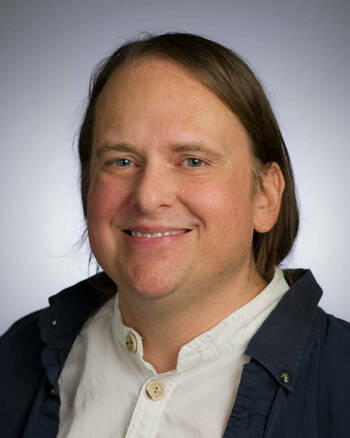In memoriam: Benjamin Radcliff, professor of political science

Benjamin Radcliff, a professor in the Department of Political Science at the University of Notre Dame, died June 10 after a long illness. He was 60.
Radcliff’s scholarly work focused on the intersection of American and comparative politics. He made significant research contributions in three primary areas: social choice theory, the political influence of organized labor and the politics of human happiness.
“He was a prolific scholar, pioneering the study of how political systems influence what he would call the ultimate dependent variable: human happiness,” said Matthew E.K. Hall, the David A. Potenziani Memorial College Professor of Constitutional Studies and director of the Rooney Center for the Study of American Democracy. “He liked to project a cantankerous, sarcastic persona, but it did little to persuade me that he was anything less than a saint.”
From Ottawa, Illinois, Radcliff received his doctorate in political science at the University of Illinois Urbana-Champaign. He held faculty positions at Rutgers University and Vanderbilt University for two years each, and was part of Notre Dame’s political science department for 30 years. During his tenure, Radcliff served as the director of graduate studies for six years and as the director of the Rooney Center from 2012 through 2013.
His book “The Political Economy of Human Happiness: How Voters’ Choices Determine the Quality of Life” detailed his research on the connection between government support for citizens and workers and overall human happiness. Radcliff also completed two edited volumes and 45 referred journal articles, 14 of which appeared in the three leading journals in political science: the American Political Science Review, the American Journal of Political Science and the Journal of Politics.
From 2019 through 2022, with department chair and professor Geoffrey Layman, Radcliff served as the co-editor-in-chief of Political Behavior — the official journal of the elections, public opinion and voting behavior organized section of the American Political Science Association. In this position, Layman said, Radcliff was known for his thorough feedback, and he often kindly explained his reasonings to authors whose manuscripts he rejected.
“Ben not only helped the journal reach new heights in terms of scholarly impact and ranking, but also was an exceedingly caring and thoughtful editor,” Layman said.
Beyond academia, Radcliff was also known for his ability to engage in enlightening conversations on subjects ranging from history and politics to music, literature, wine and arcane trivia. With his wife, Amy, Radcliff published the book “Understanding Zen,” which examined zen as a secular doctrine without any necessary relationship to Buddhism or Eastern culture. He also wrote an article on “The Beer Renaissance” in Sky, the Delta Airlines magazine.
“In short, Ben did not just study human happiness, he actively contributed to it,” Layman said.
Radcliff is survived by his wife, as well as his mother, brother and many nieces and nephews. A celebration of life is scheduled to be held in August. Those who wish to honor his memory with a donation can do so at Heifer International using the link set up by his colleagues.
Originally published by at al.nd.edu on July 3.
Latest Faculty & Staff
- Dockworkers reconsider strike that shut down East and Gulf Coast ports: A conversation with supply chain expert Kaitlin WowakThe union representing dockworkers at U.S. ports walked away from the negotiating table with port employers this week over automation concerns as the two sides face a mid-January deadline to finalize a deal and prevent the resumption of a strike. Business Analytics Professor Kaitlin Wowak discusses potential supply chain disruptions.
- When countries hide their true public debt, they hurt themselves, their citizens and their lendersGlobal public debt may soon collectively catch up to the worldwide gross domestic product (GDP), likely matching it by 2030. New research from a Notre Dame economist suggests that this could happen even sooner, thanks to countries’ hidden debts. This misreported debt can lead to higher interest rates for borrowers and lower recovery rates for lenders, suggesting indirect adverse effects on global financial stability and consumer welfare.
- Law School Professor Derek Muller joins CNN as contributor for 2024 presidential electionNationally recognized election law scholar Derek T. Muller, a professor of law at the University of Notre Dame Law School, has joined CNN as a contributor for the 2024 election cycle to provide his perspective and context to the network’s coverage of the presidential race.
- In memoriam: Rev. Gustavo Gutiérrez, O.P., renowned Notre Dame theologian, father of ‘liberation theology’Rev. Gustavo Gutiérrez, O.P., professor emeritus of theology at Notre Dame and widely regarded as the “father of liberation theology,” died Tuesday (Oct. 22) in Lima, Peru. He was 96.
- Notre Dame Forum to present ‘Fr. TED Talks’ on Catholic social tradition, featuring President Rev. Robert A. Dowd, C.S.C., and Dr. Jim O’ConnellHonoring the legacy of legendary University of Notre Dame President Rev. Theodore M. Hesburgh, C.S.C., the 2024-25 Notre Dame Forum will host “Fr. TED Talks: Ideas from the Catholic Social Tradition That We Find Inspiring,” a two-night festival on Oct. 28 and 29.
- Democrats and Republicans agree on one thing: Censoring hate speechIn an era of intense polarization, Democrats and Republicans have historically, and mistakenly, believed that members of the other party prioritize protecting certain types or victims of hate speech over others based on stereotypes or their affiliation with those potentially vulnerable groups. New research from the University of Notre Dame, however, revealed that partisans generally agree on what to censor when it comes to the target, source and severity of hate speech.













